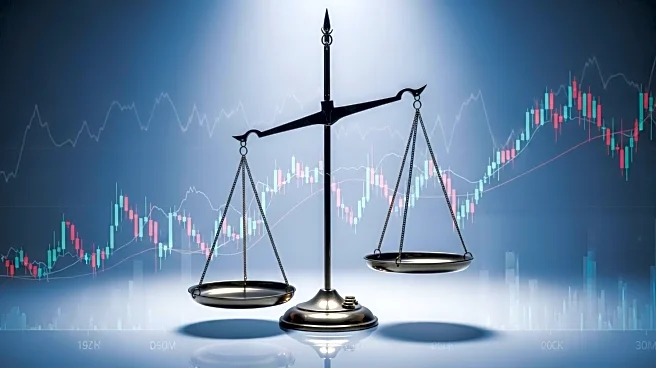What is the story about?
What's Happening?
The U.S. stock market experienced volatility as trade tensions between the U.S. and China intensified. The Dow Jones Industrial Average rose by 0.4%, while the S&P 500 fell by 0.2% and the Nasdaq Composite slid by 0.8%. The market was unsettled by China's retaliatory measures against President Trump's trade policies, including sanctions on U.S.-linked units of a South Korean shipbuilding firm and special port fees. President Trump further escalated tensions by threatening to stop U.S. purchases of Chinese cooking oil products. Additionally, Federal Reserve Chair Jerome Powell's speech at an economic conference suggested potential future rate cuts, adding to market uncertainty.
Why It's Important?
The ongoing trade tensions between the U.S. and China have significant implications for global markets and economic stability. The stock market's reaction reflects investor concerns about the potential for an all-out trade war, which could disrupt global supply chains and impact corporate earnings. The situation also highlights the interconnectedness of global economies and the influence of geopolitical events on financial markets. Powell's remarks on potential rate cuts add another layer of complexity, as monetary policy decisions can affect market sentiment and economic growth.
What's Next?
President Trump and Chinese leader Xi Jinping are scheduled to meet later this month, which could provide an opportunity for negotiations to ease trade tensions. The outcome of these discussions will be closely watched by investors and policymakers, as it could influence future trade policies and market dynamics. Additionally, the ongoing earnings season will provide insights into how major companies are navigating the current economic environment.
Beyond the Headlines
The trade tensions and market volatility underscore the broader geopolitical struggle between the U.S. and China for economic dominance. As both countries leverage their strategic advantages, such as China's control over rare earths and the U.S.'s financial system, the global economic landscape is increasingly shaped by these power dynamics. The situation also raises questions about the long-term impact on international trade relations and the potential for shifts in global supply chains.















